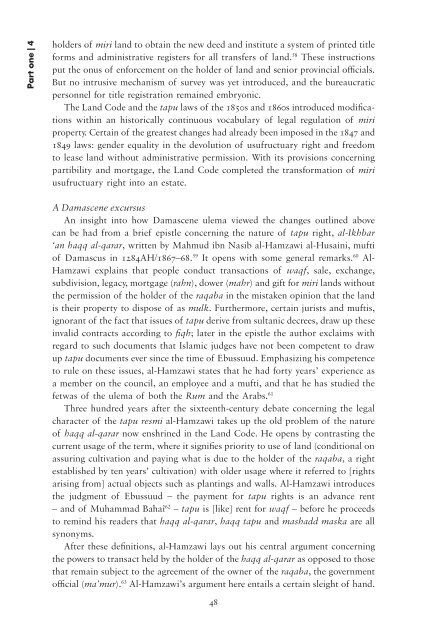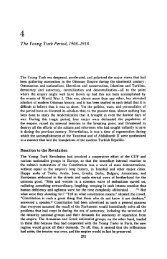Governing property, making the modern state - PSI424
Governing property, making the modern state - PSI424
Governing property, making the modern state - PSI424
You also want an ePaper? Increase the reach of your titles
YUMPU automatically turns print PDFs into web optimized ePapers that Google loves.
Part one | 4<br />
holders of miri land to obtain <strong>the</strong> new deed and institute a system of printed title<br />
forms and administrative registers for all transfers of land. 58 These instructions<br />
put <strong>the</strong> onus of enforcement on <strong>the</strong> holder of land and senior provincial officials.<br />
But no intrusive mechanism of survey was yet introduced, and <strong>the</strong> bureaucratic<br />
personnel for title registration remained embryonic.<br />
The Land Code and <strong>the</strong> tapu laws of <strong>the</strong> 1850s and 1860s introduced modifications<br />
within an historically continuous vocabulary of legal regulation of miri<br />
<strong>property</strong>. Certain of <strong>the</strong> greatest changes had already been imposed in <strong>the</strong> 1847 and<br />
1849 laws: gender equality in <strong>the</strong> devolution of usufructuary right and freedom<br />
to lease land without administrative permission. With its provisions concerning<br />
partibility and mortgage, <strong>the</strong> Land Code completed <strong>the</strong> transformation of miri<br />
usufructuary right into an e<strong>state</strong>.<br />
A Damascene excursus<br />
An insight into how Damascene ulema viewed <strong>the</strong> changes outlined above<br />
can be had from a brief epistle concerning <strong>the</strong> nature of tapu right, al-Ikhbar<br />
‘an haqq al-qarar, written by Mahmud ibn Nasib al-Hamzawi al-Husaini, mufti<br />
of Damascus in 1284AH/1867–68. 59 It opens with some general remarks. 60 Al-<br />
Hamzawi explains that people conduct transactions of waqf, sale, exchange,<br />
subdivision, legacy, mortgage (rahn), dower (mahr) and gift for miri lands without<br />
<strong>the</strong> permission of <strong>the</strong> holder of <strong>the</strong> raqaba in <strong>the</strong> mistaken opinion that <strong>the</strong> land<br />
is <strong>the</strong>ir <strong>property</strong> to dispose of as mulk. Fur<strong>the</strong>rmore, certain jurists and muftis,<br />
ignorant of <strong>the</strong> fact that issues of tapu derive from sultanic decrees, draw up <strong>the</strong>se<br />
invalid contracts according to fiqh; later in <strong>the</strong> epistle <strong>the</strong> author exclaims with<br />
regard to such documents that Islamic judges have not been competent to draw<br />
up tapu documents ever since <strong>the</strong> time of Ebussuud. Emphasizing his competence<br />
to rule on <strong>the</strong>se issues, al-Hamzawi <strong>state</strong>s that he had forty years’ experience as<br />
a member on <strong>the</strong> council, an employee and a mufti, and that he has studied <strong>the</strong><br />
fetwas of <strong>the</strong> ulema of both <strong>the</strong> Rum and <strong>the</strong> Arabs. 61<br />
Three hundred years after <strong>the</strong> sixteenth-century debate concerning <strong>the</strong> legal<br />
character of <strong>the</strong> tapu resmi al-Hamzawi takes up <strong>the</strong> old problem of <strong>the</strong> nature<br />
of haqq al-qarar now enshrined in <strong>the</strong> Land Code. He opens by contrasting <strong>the</strong><br />
current usage of <strong>the</strong> term, where it signifies priority to use of land (conditional on<br />
assuring cultivation and paying what is due to <strong>the</strong> holder of <strong>the</strong> raqaba, a right<br />
established by ten years’ cultivation) with older usage where it referred to [rights<br />
arising from] actual objects such as plantings and walls. Al-Hamzawi introduces<br />
<strong>the</strong> judgment of Ebussuud – <strong>the</strong> payment for tapu rights is an advance rent<br />
– and of Muhammad Bahaî 62 – tapu is [like] rent for waqf – before he proceeds<br />
to remind his readers that haqq al-qarar, haqq tapu and mashadd maska are all<br />
synonyms.<br />
After <strong>the</strong>se definitions, al-Hamzawi lays out his central argument concerning<br />
<strong>the</strong> powers to transact held by <strong>the</strong> holder of <strong>the</strong> haqq al-qarar as opposed to those<br />
that remain subject to <strong>the</strong> agreement of <strong>the</strong> owner of <strong>the</strong> raqaba, <strong>the</strong> government<br />
official (ma’mur). 63 Al-Hamzawi’s argument here entails a certain sleight of hand.<br />
48












